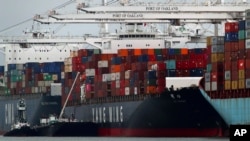ຈີນກ່າວໃນວັນສຸກມື້ນີ້ວ່າ ຕົນໄດ້ຖືກ “ບັງຄັບໃຫ້ເອົາມາດຕະການຕອບໂຕ້ທີ່ຈຳເປັນ”
ຕໍ່ສະຫະລັດ ຫຼັງຈາກວໍຊິງຕັນໄດ້ປະກາດການເກັບພາສີ ຕໍ່ສິນຄ້າຂາເຂົ້າຂອງຕົນໃນ
ມູນຄ່າຫຼາຍພັນລ້ານໂດລາ.
ປະທານາທິບໍດີສະຫະລັດທ່ານດໍໂນລ ທຣຳ ໄດ້ປະກາດເກັບພາສີ 25 ເປີເຊັນຕໍ່ຜະ
ລິດຕະພັນຂອງຈີນຫຼາຍກວ່າ 800 ຊະນິດ ຊຶ່ງພາສີດັ່ງກ່າວ ເລີ້ມມີຜົນບັງຄັບໃຊ້ນຶ່ງ
ນາທີ ຫຼັງຈາກທ່ຽງຄືນໃນວັນສຸກມື້ນີ້ ຕາມເວລາທ້ອງຖິ່ນໃນນະຄອນຫຼວງວໍຊິງຕັນ.
ຈີນໄດ້ຕ້ອງຕິນະໂຍບາຍ “ການຄ້າແບບຂົ່ມຂູ່” ຂອງວໍຊິງຕັນແລະໄດ້ເຕືອນວ່າ ການ
ເກັບພາສີດັ່ງກ່າວ ອາດຈະກໍ່ໃຫ້ເກີດ “ຄວາມວຸ້ນວາຍທາງດ້ານການຄ້າໃນໂລກ.”
ພ້ອມນີ້ ປັກກິ່ງຍັງໄດ້ເຕືອນວ່າ ຕົນຈະຕອບໂຕ້ຢ່າງແຮງແລະໃນທັນທີ ຕໍ່ການເກັບ
ພາສີໃນມູນຄ່າ 34 ພັນລ້ານໂດລາຕໍ່ສິນຄ້າຂອງຈີນ.
ກະຊວງການຄ້າຂອງຈີນກ່າວໃນວັນສຸກມື້ນີ້ວ່າ “ຝ່າຍຈີນສັນຍາວ່າຈະບໍ່ເປັນຜູ້ເລີ້ມ
ຍິງກ່ອນ ແຕ່ກໍຈະປົກປ້ອງຜົນປະໂຫຍດຕ່າງໆຂອງປະເທດ ແລະປະຊາຊົນຂອງຕົນ ຕົນໄດ້ຖືກບັງຄັບໃຫ້ຕອບໂຕ້ຄືນແບບຈຳເປັນ.”
ແຕ່ແນວໃດກໍຕາມ ຍັງບໍ່ທັນເປັນທີ່ຈະແຈ້ງເທື່ອວ່າ ຈີນຈະທຳການຕອບໂຕ້ແບບໃດ
ແທ້.
ທ່ານກາວ ເຟັ່ງ ໂຄສົກກະຊວງການຄ້າຂອງຈີນ ໄດ້ກ່າວຕໍ່ພວກນັກຂ່າວໃນວັນພະ
ຫັດທີ່ຜ່ານມານີ້ວ່າ “ຈີນ ຈະບໍ່ຍອມກົ້ມຫົວໃນການປະເຊີນໜ້າກັບການຂົ່ມຂູ່ຕ່າງໆ ແລະເອົາການເກັບພາສີມານາບຂູ່.” ທ່ານໄດ້ເນັ້ນໃຫ້ເຫັນວ່າ ປະມານ 20 ຕື້ໂດລາ ຂອງສິນຄ້າທີ່ຈະຖືກເກັບພາສີໂດຍສະຫະລັດນັ້ນແມ່ນໄດ້ຮັບການສະໜັບສະໜຸນ ໂດຍພວກນັກລົງທຶນຕ່າງປະເທດ ຮວມທັງ ສ່ວນແບ່ງທີ່ສຳຄັນ ຈາກສະຫະລັດເອງ.
ປະທານາທິບໍດີທຣຳ ຍັງໄດ້ຂົ່ມຂູ່ ທີ່ຈະເກັບພາສີມູນຕື່ມອີກ 450 ຕື້ໂດລາ ຕໍ່ສິນຄ້າ
ຕ່າງໆຂອງຈີນ ຖ້າປັກກິ່ງຕອບໂຕ້ຄືນ ດ້ວຍການເກັບພາສີຂອງຕົນ ຕໍ່ສິນຄ້າ ທີ່ສົ່ງ
ອອກຂອງສະຫະລັດ.
ການຕອບໂຕ້ກັນໄປມາທາງດ້ານການຄ້າ ລະຫວ່າງສະຫະລັດ ແລະຈີນນີ້ ໄດ້ສ້າງ
ຄວາມກັງວົນໃຫ້ແກ່ເຈົ້າໜ້າທີ່ອະວຸໂສ ຂອງທະນາຄານກາງສະຫະລັດບາງຄົນ ທີ່
ກ່າວວ່າ ມັນບໍ່ຊ່ອຍໃນການລົງທຶນທີ່ຊຸກຍູູ້ໃຫ້ເສດຖະກິດເຕີບໂຕ. ຄວາມກັງວົນດັ່ງ
ກ່າວໄດ້ຖືກເປີດເຜີຍໃຫ້ຮູ້ ໃນວັນພຸດແລ້ວ ຈາກການຫາລື ໃນດ້ານນະໂຍບາຍຫຼ້າ
ສຸດ ໂດຍພວກຜູ້ນຳຂອງທະນາຄານກາງສະຫະລັດ ຊຶ່ງເປັນຜູ້ກຳນົດ ອັດຕາດອກ
ເບ້ຍ ແລະນະໂຍບາຍເສດຖະກິດອື່ນໆນັ້ນ.
China said Friday it is "forced to take a necessary counterattack" against the United States, after Washington placed tariffs on billions of dollars of Chinese imports.
U.S. President Donald Trump has imposed 25-percent tariffs on more than 800 Chinese products.The tariffs went into effect Friday at one minute after midnight, Washington time ((0401GMT)).
China was critical of Washington's "trade bullying" and warned the tariffs could trigger "global market turmoil."
Beijing had warned it would retaliate strongly and instantly to the new tariffs on $34 billion of Chinese-made goods.
The Chinese Commerce Ministry said Friday the "Chinese side promised not to fire the first shot, but to defend the core interests of the country and people, it is forced to make a necessary counterattack."
It was not immediately clear, however, what the Chinese counterattack would be.
Ministry spokesman Gao Feng told reporters Thursday "China will not bow down in the face of threats and blackmail."He also noted that about $20 billion of the goods that will be subjected to the U.S. tariffs are backed by foreign investors, including a significant portion from the United States.
Trump has threatened up to an additional $450 billion worth of tariffs on Chinese goods if Beijing follows through on its pledge of tariffs on U.S. exports.
Growing trade friction worries some top officials of the U.S. central bank, who say it discourages investment that helps economic growth. The concerns were made public Wednesday in notes from the most recent policy discussion by leaders of the U.S. Federal Reserve, who set interest rates and other economic policies.
More U.S. economic data will come out Friday when June's unemployment rate is published. Economists surveyed by the Bloomberg financial news service say the jobless rate will probably stay at a low 3.8 percent, with a net gain of 190,000 jobs across the world's largest economy.
The Chinese embassy in Washington has issued a warning to its citizens traveling to the United States as trade tensions intensify between the two countries.
Chinese tourists were warned of things such as costly medical bills, the possibility of gun violence and robberies, seizures by customs agents and natural disasters.
"Public security in the United States is not good," said an embassy statement published last week. "Cases of shootings, robberies, and theft are frequent."
When asked Tuesday if the timing of China's travel warning was politically motivated, China's Foreign Ministry spokesman, Lu Kang, said the embassy was obligated to issue the alert because the summer is the height of the travel season for Chinese tourists visiting the U.S.
"I think this is absolutely a matter that is in the scope of our duty," Kang said.
China often issues warnings for Chinese travelers, usually in war-afflicted regions. But some foreign governments have accused China of using tactics such as curtailing outbound tourism to settle political or trade disputes, accusations that China typically denies.
The United Nations reported last year China has led the world since 2012 in the number of tourists who travel abroad. The U.N. said Chinese tourists spent $261 billion in foreign countries in 2016, more than double the amount travelers from the U.S. spent.
More Chinese tourists are visiting the U.S., according to the U.S. Commerce Department. It said nearly 3 million visited the U.S. in 2016, a nearly six-fold increase since 2009.Chinese tourist visits to the U.S. rank fifth behind Canada, Mexico, Britain and Japan.
A 2017 survey of Chinese and other tourists by the marketing firm Nielsen found that half of the Chinese respondents said the safety of a destination would impact their decision on where to travel.





